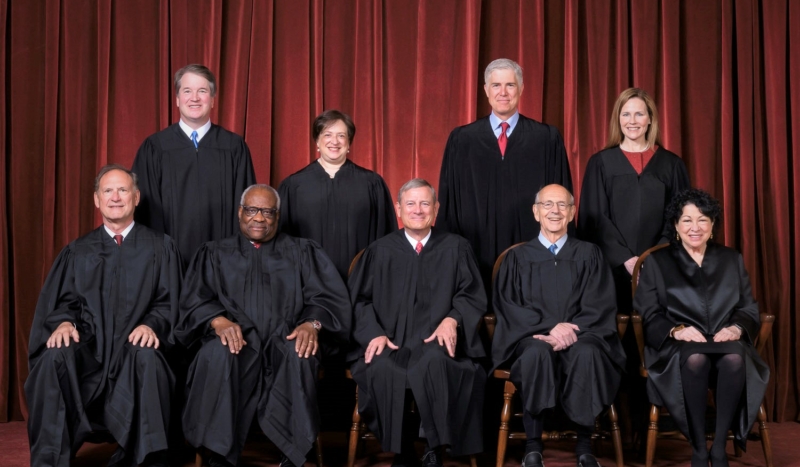
The Roberts Court, April 23, 2021 Seated from left to right: Justices Samuel A. Alito, Jr. and Clarence Thomas, Chief Justice John G. Roberts, Jr., and Justices Stephen G. Breyer and Sonia Sotomayor Standing from left to right: Justices Brett M. Kavanaugh, Elena Kagan, Neil M. Gorsuch, and Amy Coney Barrett. Photograph by Fred Schilling, Collection of the Supreme Court of the United States
CV NEWS FEED // The Supreme Court announced Friday that it would hear two challenges against Texas’ heartbeat law, which prohibits most abortions after about six weeks of gestation.
The two challenges come from the Biden administration and from private abortion groups respectively. In hearing the challenges, the high court will consider whether the United States Government would be within its rights to block enforcement of the law, and whether abortion groups can proceed with lawsuits against the State of Texas or its officials.
Despite immense pressure from the Biden administration and abortion groups to do otherwise, the Supreme Court will allow the Texas law to remain in effect pending the outcome of the challenges, for which the court will begin hearing oral arguments Nov. 1.
The Supreme Court first declined to pause enforcement of the law when it went into effect Sept. 1. At the time, President Biden was outraged by their decision, which he described as “an unprecedented assault on constitutional rights under Roe v. Wade.” The president also threatened “a whole-of-government effort to respond to this decision.”
Since then, the Biden administration, including its Justice Department and Department of Health and Human Services, have sought every opportunity to thwart the Texas law. Those efforts, working in tandem with abortion industry leaders such as Planned Parenthood, have so far come up dry.
Last week saw the latest example of pro-abortion efforts to challenge the law failing, when the 5th Circuit Court of Appeals denied a request to pause enforcement. That decision marked “the third time since October that the conservative-leaning appeals court has sided with Texas and let the restrictions stand,” reported Politico:
It leaves the Justice Department and Texas abortion providers with a narrowing path to try stopping the law….
Despite numerous legal challenges both before and after the law took effect Sept. 1, only once has a court moved to put the restriction on hold — and that order only stood for 48 hours.
Justice Sonia Sotomayor concurred “in part” with the Supreme Court’s decision this week, and also dissented in part, arguing that the “Court should have paused the law instead,” reported Kimberly Robinson of Bloomberg Law Friday. “The promise of future adjudication offers cold comfort, however, for Texas women seeking abortion care,” Sotomayor stated.
It takes five Justices’ votes “to block the law,” Robinson added, but only four “to grant” or hear a case. “Presumably the same four Justices (Roberts, Breyer, Sotomayor, Kagan) who would have stopped the law in September would have wanted to do it now.”
Many court watchers noted the degree to which the Supreme Court has expedited both challenges to the Texas law. “Opening briefs due Wednesday 10/27 with responses Friday 10/29. That sure is ‘expedited,’” wrote Robinson.
Steve Vladeck of the University of Texas School of Law remarked that the Court is moving “stunningly” quickly. “The last time I can recall so little time (here, 10 days) between the Court agreeing to take up a case and the oral argument was in December 2000, in Bush v. Gore,” he wrote.
Abortion opponents and advocates alike will inevitably observe these cases in light of the highly consequential upcoming abortion case Dobbs v. Jackson Women’s Health, which the high court will begin hearing Dec. 1.
As CatholicVote has reported, the Supreme Court now has a majority of justices who are widely considered to be pro-life, and the “Court compounded that impression when it allowed Texas’ abortion ban to go into effect in September.”
In addition, the Dobbs case
comes with a brief from Mississippi’s Attorney General urging the Supreme Court to repeal Roe v. Wade and return the issue of abortion to the states. …Justice Clarence Thomas, meanwhile, has openly called for the repeal of Roe v. Wade.

